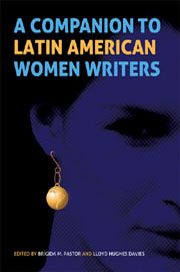Book contents
- Frontmatter
- Contents
- Introduction: The Feminine Voice in Latin American Literature
- 1 Sor Juana Inés de la Cruz (1648/51?–1695)
- 2 Gertrudis Gómez de Avellaneda (1814–1873)
- 3 Gabriela Mistral (1889–1957)
- 4 Alfonsina Storni (1892–1938)
- 5 Silvina Ocampo (1903–1993)
- 6 Clarice Lispector (1920–1977)
- 7 Rosario Castellanos (1925–1974)
- 8 Elena Poniatowska (1933– )
- 9 Alejandra Pizarnik (1936–1972)
- 10 Luisa Valenzuela (1938– )
- 11 Isabel Allende (1942– )
- 12 Rosario Ferré (1938– )
- 13 Laura Esquivel (1950– )
- 14 Laura Restrepo (1950– )
- Conclusion
- Bibliography
- Index
13 - Laura Esquivel (1950– )
Published online by Cambridge University Press: 05 February 2013
- Frontmatter
- Contents
- Introduction: The Feminine Voice in Latin American Literature
- 1 Sor Juana Inés de la Cruz (1648/51?–1695)
- 2 Gertrudis Gómez de Avellaneda (1814–1873)
- 3 Gabriela Mistral (1889–1957)
- 4 Alfonsina Storni (1892–1938)
- 5 Silvina Ocampo (1903–1993)
- 6 Clarice Lispector (1920–1977)
- 7 Rosario Castellanos (1925–1974)
- 8 Elena Poniatowska (1933– )
- 9 Alejandra Pizarnik (1936–1972)
- 10 Luisa Valenzuela (1938– )
- 11 Isabel Allende (1942– )
- 12 Rosario Ferré (1938– )
- 13 Laura Esquivel (1950– )
- 14 Laura Restrepo (1950– )
- Conclusion
- Bibliography
- Index
Summary
Laura Esquivel, one of the most prominent of contemporary Mexican women writers, was born in Mexico City in 1950. Although her first novel was published in 1989, Esquivel had worked previously as a teacher, writing plays for children, and then writing television and film scripts. It was, however, her first full-length novel which was to bring her wide-spread fame and success: Como agua para chocolate: novela de entregas mensuales, con recetas, amores y remedios caseros [Like Water for Chocolate: A Novel in Monthly Instalments with Recipes, Romances, and Home Remedies]. Since this, her first and most successful novel, Esquivel has continued publishing, following up with the novels La ley del amor [The Law of Desire] in 1995, Tan veloz como el deseo [Swift as Desire] in 2001 and Malinche in 2005, as well as a collection of short stories and essays, Íntimas suculencias [Between Two Fires: Intimate Writings on Life, Love, Food and Flavor], in 1998, the children's story Estrellita marinera [Marine Star] in 1999, and the non-fiction work El libro de las emociones: son de la razón sin corazón [Book of the Emotions] in 2000.
Como agua para chocolate
Studies of Esquivel must of necessity begin with her first and most commercially successful novel, Como agua para chocolate [Like Water for Chocolate]. The runaway sales figures for the novel, which has, to date, been translated into thirty-five languages with over 4.5 million copies printed worldwide, have ensured its prominence, and make it one of the key works in the so-called Mexican boom femenino.
- Type
- Chapter
- Information
- A Companion to Latin American Women Writers , pp. 183 - 196Publisher: Boydell & BrewerPrint publication year: 2012



